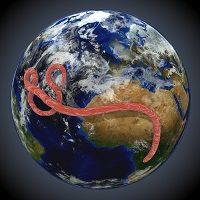Unique Ebola Vaccine Delivery Strategy Could Stop Ape-to-Human Transmission
Putting an end to a lethal virus may mean going directly to the source, as one study suggests a possible approach to stopping the transmission of the Ebola virus.

Putting an end to a lethal virus may mean going directly to the source, as one study suggests a possible approach to stopping the transmission of the Ebola virus.
Michael Jarvis, PhD, and his Plymouth University colleagues began the study to protect both humans and endangered ape species. What the team found was a unique approach to delivering a single-dose vaccine resulting in long-lasting immunity against Ebola virus disease.
Since apes serve as a main source of Ebola transmission to humans, the research was conducted on the basis that if the virus could be prevented in apes, then that would lower the frequency and severity of outbreaks among humans. The study, “A cytomegalovirus-based vaccine provides long-lasting protection against lethal Ebola virus challenge after a single dose,” was published in Vaccine on March 25.
Cytomegalovirus (CMV) is very immunogenic, species-specific, and can easily spread between individuals. Since many of the potentially infected apes live in remote locations, the researchers have proposed using a CMV-based approach to distribute the vaccine without direct contact with the apes.
The researchers innovative strategy is to use a “CMV-based ebolavirus vaccine that can spread through wild ape populations as a means to provide high levels of protective ebolavirus-specific immunity without the need for direct vaccination.”
“We must walk before we can run, but this study provided a little skip,” Jarvis said in a news release.“However, this disseminating approach does potentially provide a workable solution to a currently intractable problem of achieving high vaccine coverage in inaccessible ape populations.”
In 2011 the same team did anEbola virus CMV-based vaccine study using mice. The previous research only touched on short-term protection, about 6 weeks post-vaccination, against the virus. The new study showed that a single dose of the vaccine provided immunity against Ebola for at least 119 days after distribution. Not only that, but it provided Ebola immunity responses even longer than 14 months post-vaccination.
The researchers are also working to develop a CMV-based vaccine that humans can use to sustain long-lasting immunity.
While questions remain about the individual contact distribution of the vaccine among the apes, there is great progress to be made. The next step in the process is to trial the vaccine.
“Given the impact of ebolavirus on African ape numbers in the wild, and the role of apes as a route of ebolavirus transmission to humans via the bush meat trade, such a vaccine would be a win-win for humans and wild apes alike,” Jarvis said.